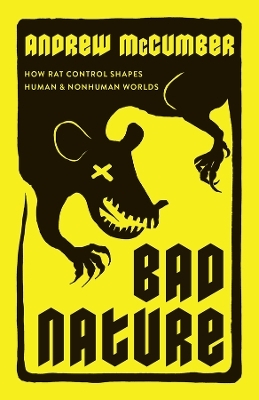
Bad Nature
University of Chicago Press (Verlag)
978-0-226-83898-4 (ISBN)
- Noch nicht erschienen (ca. Mai 2025)
- Versandkostenfrei innerhalb Deutschlands
- Auch auf Rechnung
- Verfügbarkeit in der Filiale vor Ort prüfen
- Artikel merken
Apart from the occasional pet owner who has rats, most people regard rats as disease-carrying nocturnal pests, scurrying around dumpsters and dragging slices of pizza through New York City subways. Since rats are seemingly omnipresent in human life, why do we harbor such negative feelings about them, and why are they among the creatures most frequently targeted for systematic extermination?
In Bad Nature, sociologist Andrew McCumber draws out the cultural underpinnings of rat extermination across three countries and two continents. Drawing from ethnographic, interview, and textual data from the frigid prairie of Alberta, Canada; the heart of downtown Los Angeles, California; and the iconic Galápagos Islands of Ecuador, McCumber studies how humans have sought to suppress and exterminate rat populations in a variety of environmental, social, and political situations. He shows how, in these disparate locations, rat control is a social practice that draws and clarifies the spatial and symbolic boundaries between “good” and “bad” forms of nature. Rats are near the bottom of a symbolic hierarchy of species that places human life at the top, companion animals and majestic wildlife just below them, and the “invasive species” that call for systematic extermination at the very bottom. This hierarchy of living things that places rats at the bottom, McCumber argues, mirrors human systems of social inequalities and power dynamics.
Both original and engaging, Bad Nature urges readers to consider, when charting a just and sustainable future, where will the rats be placed in the worlds we envision?
Andrew McCumber is assistant professor of sociology at Virginia Tech University. His research on cultural meaning and nature has previously been published in journals including Sociological Forum, Cultural Sociology, and Poetics, along with interdisciplinary outlets such as Environmental Humanities and Nature + Culture.
1. Introduction
Part I: Animals in Boundary Work
2. Rats and “Boundary Work” on the Canadian Prairie
3. “You Can’t Ignore the Rat”: Guarding Alberta’s Moral Character
Part II: The Borders of Urban Nature
4. Rats and the Indoors/Outdoors Divide
5. Bulky Items: The “Rat Problem” and the “Homeless Problem” in Downtown LA
Part III: Ecologies of Meaning
6. Ecologies of Meaning in Ecuador’s Galápagos Islands
7. Killing for Life: Morally Acceptable Lives and Deaths in Environmental Conservation
8. Conclusion
Acknowledgments
Appendix A: Regression Results Table
Appendix B: Natural Language Processing
References
Index
| Erscheint lt. Verlag | 22.5.2025 |
|---|---|
| Zusatzinfo | 6 halftones, 1 tables |
| Sprache | englisch |
| Maße | 140 x 216 mm |
| Gewicht | 454 g |
| Themenwelt | Sachbuch/Ratgeber ► Natur / Technik ► Naturführer |
| Naturwissenschaften ► Geowissenschaften ► Geografie / Kartografie | |
| Sozialwissenschaften ► Soziologie ► Allgemeines / Lexika | |
| ISBN-10 | 0-226-83898-6 / 0226838986 |
| ISBN-13 | 978-0-226-83898-4 / 9780226838984 |
| Zustand | Neuware |
| Haben Sie eine Frage zum Produkt? |
aus dem Bereich


